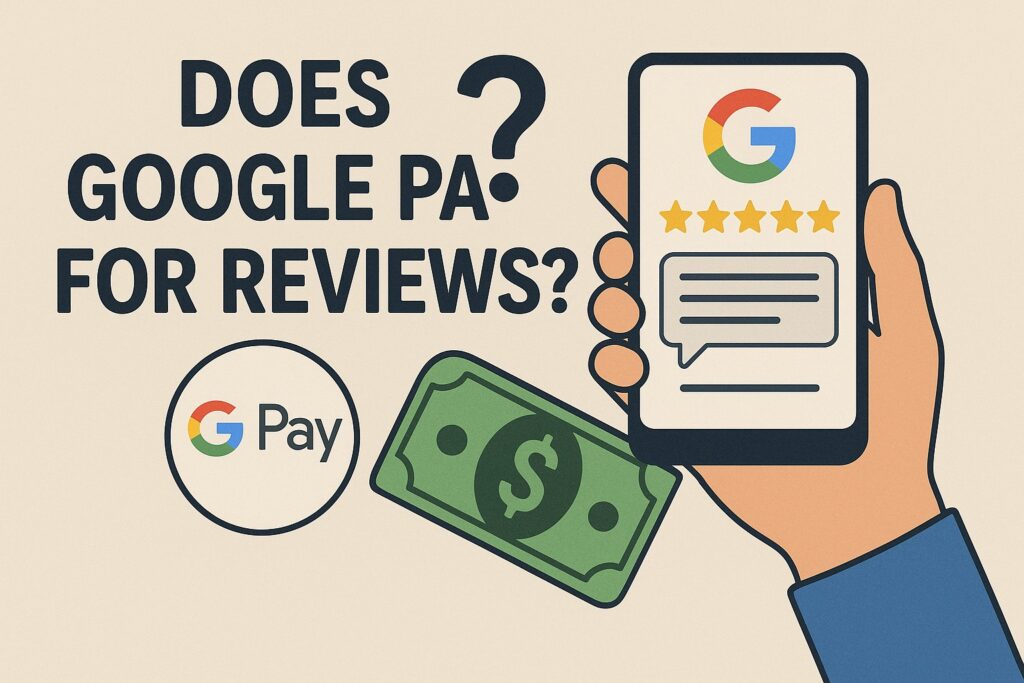The credibility of online reviews has a direct impact on how businesses are perceived and chosen by customers. With Google being the dominant platform for local business discovery, many people wonder if the search giant pays users to leave reviews or compensates contributors in some way. This confusion often stems from reward-based programs like Google’s Local Guides, as well as growing concern over fake or incentivized reviews in general.
Understanding Google’s approach to user-generated reviews is essential for both consumers and business owners. In this article, we’ll clear up whether Google pays for reviews, what its official policies say, and how businesses can earn legitimate feedback without risking penalties.
Google’s Official Policy on Reviews
Google maintains a strict policy when it comes to user reviews on its platforms, especially Google Maps and Google Business Profiles. According to Google’s review policies, all reviews must reflect a genuine experience and should not be posted in exchange for payment, discounts, gifts, or other incentives.
The key points in Google’s review guidelines include:
- Reviews must be based on real experiences.
- Posting content in exchange for money or services is strictly prohibited.
- Businesses are not allowed to offer incentives in return for positive reviews.
- Fake reviews, whether positive or negative, are a violation and can lead to removal.
Google uses a combination of automated systems and human moderation to detect suspicious review activity. Violating these policies can result in the deletion of reviews, suspension of business profiles, or even permanent bans for users abusing the system.
The foundation of Google’s review system is trust. That’s why the platform emphasizes authentic, unbiased contributions from real customers — not paid content.
Does Google Directly Pay Users for Reviews?
No — Google does not directly pay users to leave reviews on any of its platforms, including Google Maps and Google Business Profiles. There is no financial compensation, gift card, or commission model tied to submitting reviews through Google’s standard review tools.
This includes:
- Leaving reviews for businesses on Google Maps
- Rating and writing comments about locations, services, or products
- Uploading photos or answering questions in review sections
Any claim suggesting that Google pays cash for reviews is either misinformation or refers to unrelated third-party programs that often violate Google’s terms of service.
The confusion sometimes arises due to Google’s Local Guides program, which includes a points system — but this is not a direct payment model (more on that in the next section). Google explicitly prohibits paying individuals for reviews and considers it a manipulation of its content policies.
If users encounter platforms or individuals offering money in exchange for posting Google reviews, they should assume the offer is illegitimate and potentially fraudulent.
Google Local Guides Program: Is It a Reward System?
The Google Local Guides program is often misunderstood as a paid initiative, but it’s not designed to offer direct financial compensation. Instead, it’s a gamified contribution system that encourages users to improve Google Maps through photos, reviews, Q&As, and edits.
Here’s how it works:
- Contributors earn points for each action they take (writing a review, adding photos, answering questions, etc.)
- As users accumulate points, they level up and may receive occasional perks — such as early access to Google features, Local Guides-branded merchandise, or invitations to exclusive events.
- These perks are not guaranteed, have no cash value, and are offered solely at Google’s discretion.
Importantly, participation in the Local Guides program is voluntary, and Google clearly states that contributions should be honest and unbiased, regardless of whether perks are offered. Any attempt to manipulate the system for rewards, such as posting fake reviews, violates the program’s rules.
So while users may receive recognition or non-monetary benefits, the Local Guides program is not a paid review platform.
Can Businesses Pay for Google Reviews?
No — businesses are strictly prohibited from paying for Google reviews. Whether it’s through cash, discounts, gifts, or any form of compensation, offering incentives in exchange for reviews violates Google’s policies.
This includes:
- Hiring individuals or agencies to leave fake positive reviews
- Offering customers discounts or freebies for writing reviews
- Using review exchange networks or review farms
- Posting reviews on your own business from fake or personal accounts
Google uses sophisticated algorithms to detect unnatural review patterns. If a business is caught purchasing reviews or manipulating their rating, the consequences can include:
- Removal of all suspicious reviews
- Lower visibility in local search rankings
- Suspension or deletion of the business profile
- Permanent bans from Google services in extreme cases
Beyond platform enforcement, buying reviews can also violate consumer protection laws in several countries, including the U.S., U.K., and EU. Regulatory bodies like the FTC can issue fines or take legal action against companies using deceptive review practices.
The bottom line: paying for Google reviews is not just unethical — it’s risky and potentially illegal.
Consequences of Paid or Fake Reviews
Engaging in fake or paid review practices doesn’t just violate Google’s policies — it carries serious consequences for both users and businesses.
1. Review Removal
Google routinely detects and removes fake or incentivized reviews. This can wipe out large numbers of positive ratings overnight, damaging the business’s reputation and trustworthiness.
2. Account Suspensions
Repeated violations may result in the suspension of either the business profile or user accounts. For businesses, this means disappearing from Google Maps and local search results — a critical loss in visibility.
3. Loss of Customer Trust
Even if fake reviews aren’t immediately caught by Google, customers often spot patterns in overly positive or generic reviews. If a business is exposed for manipulating reviews, the damage to its reputation can be long-lasting.
4. Legal and Regulatory Action
In many countries, posting or soliciting fake reviews is considered deceptive advertising. Regulatory agencies like the U.S. Federal Trade Commission (FTC) or the U.K.’s Competition and Markets Authority (CMA) can issue warnings, fines, or initiate lawsuits.
5. Harm to Local SEO
Google’s local ranking algorithm places a strong emphasis on review authenticity. Manipulating reviews can negatively affect a business’s local SEO performance, causing it to fall behind competitors who maintain genuine reputations.
These consequences highlight why businesses and users should avoid shortcuts and focus on building trust through legitimate engagement.
How to Earn Trustworthy Reviews the Right Way
Getting legitimate, high-quality Google reviews doesn’t require incentives or shortcuts. Businesses can build a strong online reputation by following ethical strategies that comply with Google’s guidelines and foster real customer trust.
1. Ask at the Right Time
The best time to request a review is shortly after a positive interaction — when the experience is still fresh.
2. Make It Easy
Provide customers with a direct link to your Google review page via emails, thank-you pages, or printed materials.
3. Use Clear, Polite Requests
Encourage honest feedback without demanding specific ratings. Avoid language that could be interpreted as incentivized.
4. Respond to Reviews — Positive or Negative
Thank happy customers and professionally address complaints to show you care about feedback.
5. Stay Consistent
Make review collection a regular habit in your customer journey process.
6. Educate Your Team
Ensure your staff knows how to talk about reviews legally and ethically without crossing Google’s guidelines.
By focusing on transparency and service quality, businesses can build a robust and trustworthy review profile that helps with both visibility and conversions — without risking penalties.
Conclusion
Google does not pay users for reviews, nor does it allow businesses to incentivize customers for them. While programs like Local Guides may offer perks, they are not forms of direct compensation. Paid or fake reviews not only violate Google’s policies but also carry serious consequences — from account suspensions to legal risks.
For businesses, the most effective and sustainable strategy is earning reviews organically by delivering excellent service and making it easy for satisfied customers to share their experiences. Trust, authenticity, and compliance with Google’s guidelines are what drive long-term visibility and credibility in search.

I built this tool to help business owners get more reviews by sending review requests easily. The system automatically filters positive and negative reviews. Feel free to try the full system before making any payment.


